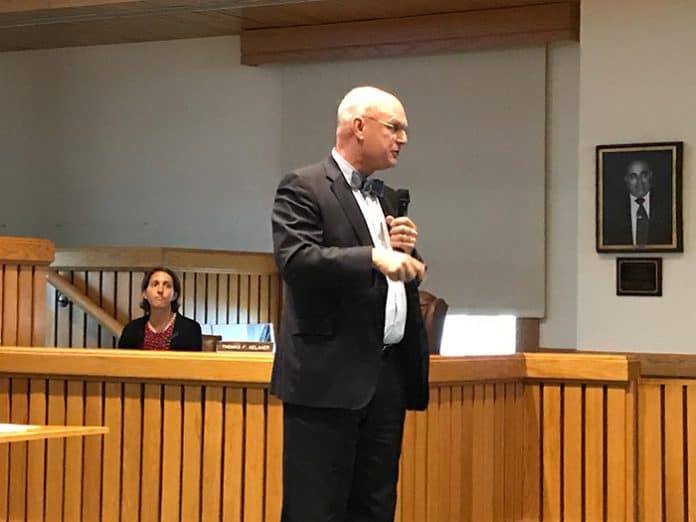
TOMS RIVER – The township’s tax rate is staying flat for the third straight year, but some warn that if surplus keeps being used it might have a negative impact.
The total budget is $130,769,113, up $5,373,800 from last year’s $125,395,302.
The amount to be raised by taxes is $82,690,095, up slightly from last year’s $82,089,203.
The tax rate will remain at 63 cents per $100 of assessed valuation. For the average home valued at $273,900, the taxes will be $1,739.81. This is just the figure for municipal taxes, and does not include other taxes such as those paid to the county or school.
Increases to pensions and health benefits make up about $3 million. Increases like this are not sustainable, business administrator Don Guardian said. The township is looking into self-insuring in the future, which might be less costly.
The township was down billions of dollars in ratables after Superstorm Sandy. Ratables are all the taxable property in an area. So much property was destroyed, and taxes are based on property assessments, that it shifted the burden toward properties that survived. Now, more properties are coming back online, so the taxes can be spread out wider, but the town is still half a billion dollars behind pre-Sandy numbers.
Guardian also said that the town’s average tax liability is lower than both the average for the county and the average for the state.
Councilman Maurice Hill said it’s been difficult to maintain a budget for three years that didn’t have any tax rate increases.
Councilman Daniel Rodrick was the sole “no” vote on the budget, because he said he felt that the township should have shopped around for a better insurance plan.
Hill and Rodrick are both running for mayor in the Republican primary, against former Ocean County Prosecutor Joseph Coronato.
Rodrick had stated that while the tax rate stayed the same, spending still needs to get under control or there could be negative impacts.
In an email after the budget presentation, chief financial officer Sharon Smith explained that $19 million of the town’s surplus was spent to balance the budget. This is up from last year’s $17 million.
“It has the potential to affect our bond rating due to the larger-than-usual draw from surplus to balance the 2019 budget,” she said. “Rating agencies frown upon large draws from surplus that a town cannot foreseeably make back through operations.”
A bond rating is given by a third party company to determine how easily a town (for example) can pay back debt. The better the rating, the lower the interest.
The town can’t foreseeably generate $19 million in surplus, she said. By way of comparison, the town made back $15.53 million last year.






